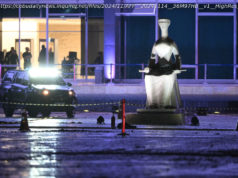Among the 20 people killed in racing waters were a high school freshman, an Army veteran, toddler twins and a mother of five.
Joseph Prasnikar cannot escape the haunting memory of the last time he saw his wife alive: They were at home, clutched in each other’s arms, as rising water swirled around them. He slipped below the surface. When he climbed back up, she was gone. The image seared in his mind is vivid and horrifying. He fears it will overpower his memory of the affection and simple comfort that defined the 17 years they had together. Now, days after powerful floods descended on his Middle Tennessee community, Mr. Prasnikar is putting every ounce of effort into preserving his memories of his wife, Hallie Gerber, and the qualities that make losing her so agonizing: her persistent kindness, her zeal in caring for him as he navigated a litany of health problems. He already misses walking their dogs with her, both of which were also lost in the floods. “Just that connectedness,” he said, describing their bond, “that presence for each other that most people don’t know exists.” Ms. Gerber,60, was one of 20 people killed last weekend as flash floods tore through communities tucked into the rolling Tennessee woods. Even though the water has receded, residents remain gripped by excruciating grief, their minds etched with the terror of watching loved ones swept away by torrents that seemed to arrive out of nowhere. Officials said on Wednesday that all of those missing in the aftermath of the storm have been accounted for. “We are sad that our count is now at 20,” Grant Gillespie, the police chief in Waverly, said. “Our families now have the closure that they need to move on.” The dead include 7-month-old twins, Rileigh and Ryan Rigney, who were happiest when they were with each other, and Joe Reeves, a U.S. Army veteran who often stopped to help strangers fix a flat tire and, in his last moments, sacrificed his own well-being to help his wife and one of his daughters escape. “He passed away saving their lives,” an older daughter, Rachel Reeves,29, said. “My dad was a hero.” The stories of those who died illustrate what had tied residents to the region but also what will make it so challenging to rebound. In the area’s small communities, nearly everyone was connected to someone who was killed or whose life was otherwise upended. The collection of small towns connected by two-lane highways winding through woods and farmland is only about 90 minutes west of Nashville, but in some ways it feels farther. In Waverly, a city of 4,100 that saw some of the worst destruction, modest family homes were clustered together on narrow streets, close enough that neighbors could hold conversations from their front porches.






